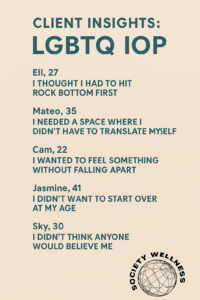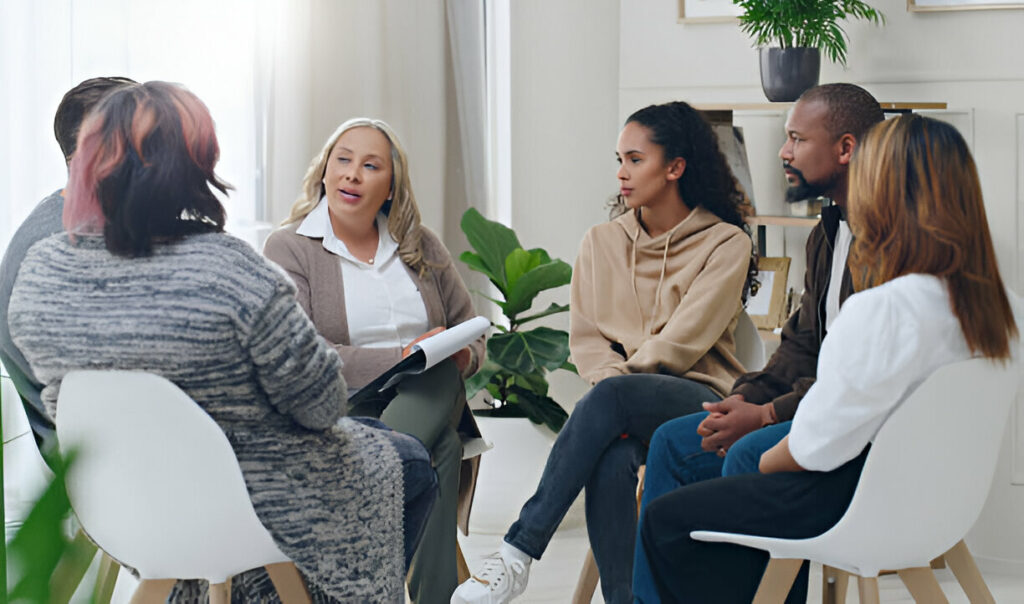There’s a quiet kind of crossroads that some people come to.
You’re not in crisis, exactly. But things aren’t right. Maybe you’re drinking more than you used to. Maybe you’re using to manage feelings you can’t name. Maybe you’re holding things together on the outside, but inside? You’re searching.
And when you’re LGBTQ+, that search gets layered. You’re not just looking for help—you’re looking for a space where you won’t have to explain your pronouns, defend your relationships, or feel like a side note in your own story.
That’s where outpatient care can come in—specifically, an LGBTQ intensive outpatient program (IOP) like the one we offer at Society Wellness in Boston.
What does that actually feel like? These five clients were kind enough to share their stories (with names changed), so you can hear it from the inside.
1. Eli, 27 — “I Thought I Had to Hit Rock Bottom First”
Eli identifies as nonbinary and had never been to treatment before. “I thought outpatient programs were only for people in full-blown crisis,” they said.
But the panic attacks were coming more often. They were drinking to get through social events and work stress. “I kept thinking, ‘This isn’t that bad. I’m still showing up.’ But I was scared.”
When Eli found Society Wellness, something clicked. “They didn’t make me prove anything. I didn’t have to justify why I was there.”
Through IOP, Eli learned that early intervention isn’t weakness—it’s wisdom. “Waiting until it’s worse doesn’t make you stronger. It just makes healing harder.”
2. Mateo, 35 — “I Needed a Space Where I Didn’t Have to Translate Myself”
Mateo is a gay Latino man who had tried therapy before—but only once. “It felt like the therapist didn’t know what to do with me,” he said. “Every session felt like I was educating her instead of healing.”
He’d been managing anxiety with alcohol for years. Not “out of control,” but not healthy either.
A friend referred him to Society Wellness’s LGBTQ IOP. “At first I rolled my eyes. I didn’t think a group setting would work for me. But when I saw people like me—queer, Latinx, real people—it was different.”
Now Mateo describes group as “the first room I’ve ever entered where I didn’t have to shrink.”

3. Cam, 22 — “I Wanted to Feel Something Without Falling Apart”
Cam is a trans college student who came to IOP after being sober for several months. “I wasn’t using anymore, but I didn’t feel anything either. I was just numb.”
What Cam feared most was that therapy would focus only on substance use—and ignore everything else.
“But at Society Wellness, I didn’t have to choose between my gender and my recovery,” they said. “We talked about dysphoria, family stuff, dating, grief—all of it.”
Cam now calls IOP “the bridge” between survival and connection. “It gave me the tools to feel things—and stay standing.”
4. Jasmine, 41 — “I Didn’t Want to Start Over at My Age”
Jasmine had been sober before. In fact, she had years of experience in the recovery community. But after a move and some personal losses, she started sliding.
“Nothing dramatic,” she said. “Just skipped meetings. Drank a little here and there. And then I realized—I didn’t feel like I could go back to the old rooms. I didn’t want to explain why I’d ‘failed.’”
Jasmine found Society Wellness through a therapist who recommended LGBTQ-specific care.
“At first, I felt ridiculous. I was the oldest in the group. But they welcomed me. I wasn’t treated like a lost cause—I was treated like someone still worth helping.”
Now Jasmine helps mentor others in early recovery through community work and outreach.
5. Sky, 30 — “I Didn’t Think Anyone Would Believe Me”
Sky was raised in a conservative religious home. For years, they hid their identity—and their substance use. “I thought if anyone knew who I really was, I’d lose everything.”
When they hit a low point, they didn’t call family. They Googled “LGBTQ IOP Boston” and found Society Wellness.
“I expected to feel out of place. I expected to feel ashamed,” they said. “Instead, I was met with quiet understanding. No one asked me to be anything but honest.”
Sky says IOP helped them reconnect with their body, their truth, and their own sense of safety. “It wasn’t about being fixed. It was about being seen.”
FAQs About LGBTQ Outpatient Treatment
Q: Do I have to be sober already to start IOP?
No. Many people come to IOP while still actively using or in early sobriety. We meet you where you are and help you build stability.
Q: I’ve never done therapy. Is this too intense?
IOP is structured—but supportive. You don’t need to have the right language or be “good at” therapy. You just need to show up.
Q: Will I be the only LGBTQ person in the room?
No. This program is specifically designed for LGBTQ adults. You’ll be with people who understand the nuances of identity, recovery, and belonging.
Q: Can I work or go to school while attending?
Yes. IOP is typically 3–4 days a week, for about 3 hours per session. We’ll help you schedule care around your life, not the other way around.
Q: What if I’m not sure I belong in treatment at all?
If you’re wondering about that, it’s usually a sign you’re ready to talk to someone. You don’t have to be “bad enough” to deserve support.
You Don’t Have to Be Sure—Just Honest Enough to Ask
Each of these clients started with doubts. About whether they needed help. About whether outpatient care would be too clinical, too intense, or not affirming enough.
But they made one choice that changed everything: they started.
If you’re LGBTQ+ and wondering whether there’s a space for you to sort through things—your habits, your history, your identity—there is.
Call Society at(888) 964-8116 or learn more about our LGBTQ intensive outpatient program in Boston.

